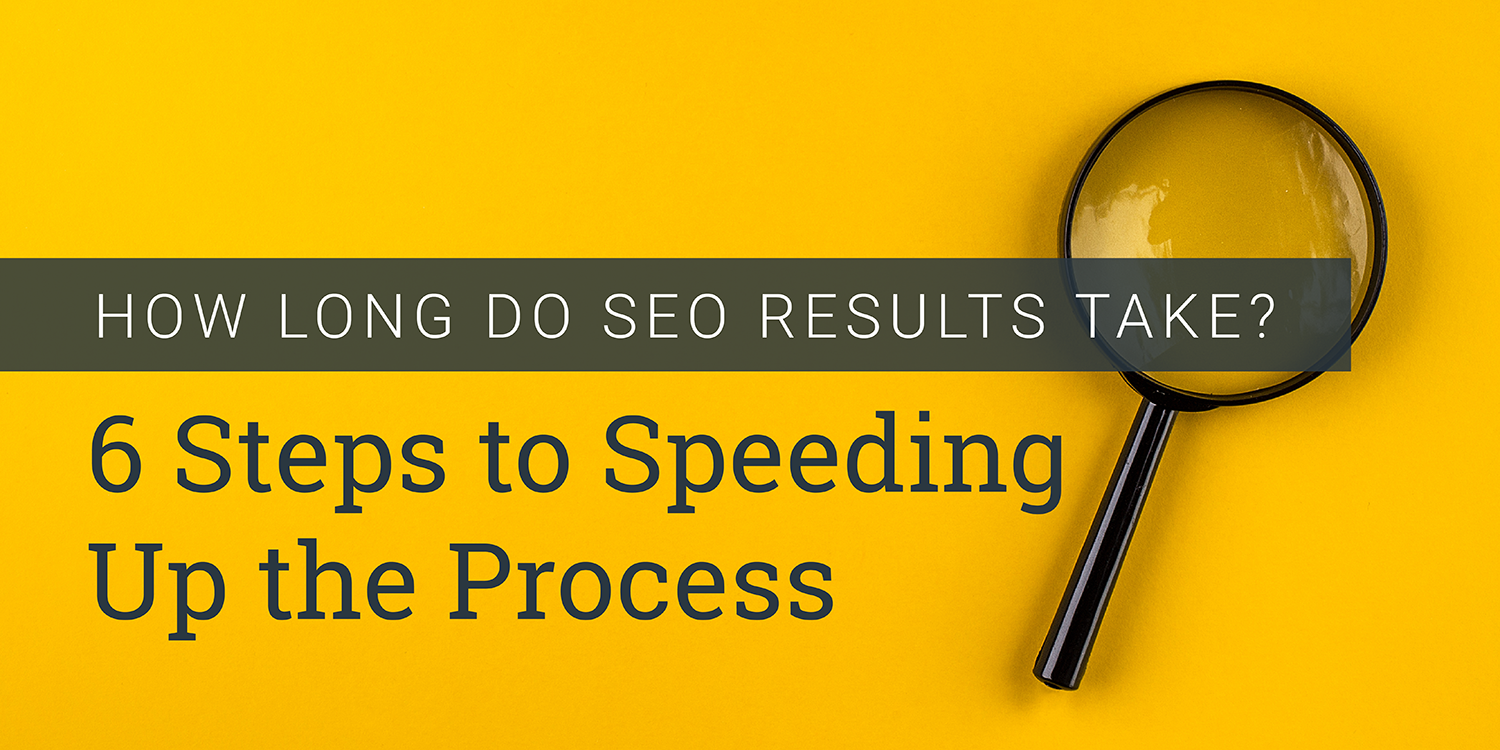
Lately, we’ve seen a renaissance when it comes to SEO. Search Engine Optimization (SEO) seems to be having (another) moment - at least for us.
When it comes to SEO, the perennial question is:
“How long do SEO results take?”
We get it. If you’re considering paying for SEO services, it’s only natural that you want to know how long it will be before you experience the bang for your buck.
Unfortunately, most times the honest answer is, “It depends.” If an SEO agency makes a promise that seems “too good to be true”, it probably is. Do yourself a favor and walk away. The real story is, SEO is complicated and the results you get are dependent on dozens of factors that you may or may not have control over. Throw in about 9 algorithm updates from Google per day, and you've got a party.
Given all of this, what CAN you do to jumpstart your SEO campaign?
1. Acknowledge that SEO doesn’t happen in a vacuum
When I first got started doing SEO, the Internet was a little like the Wild West. Let’s just say there weren’t a lot of rules. People found ways to game the system and they used those tactics until they no longer worked. In some industries, there wasn’t a lot of competition so the opportunities were plentiful and wide open.
Between 1996 and 1997, the year we founded ArcStone, the Internet grew immensely, going from 257K to 1M+ websites. With that surge in population comes competition, and with time comes maturity and processes.
Today, there are over 1.5 billion websites! That means it’s a lot more difficult to stand out from all of the noise than it once was. In other words, you’re not the only one writing and optimizing new content, vying for a coveted first page spot.
2. Look for a Team with a Deep Bench
One challenging aspect of SEO is that it’s naturally conflated with other disciplines like design, copywriting and content, development, and hosting environments. Design that offers an excellent user experience is key. Similarly, your hosting environment needs to be speedy and error-free.
If your SEO partner never touches your website, you probably won’t see great results. Instead, look for a partner with expertise in SEO, content, design, development, and hosting, for the biggest impact.
Some common issues that might be Negatively impacting your SEO results include:
- Poor website speed performance
- A website that’s not secure
- A website riddled with technical errors
- Poorly optimized pages and metadata
3. Consider the Competition ALWAYS and Don’t Turn Your Nose Up to Longtail Opportunities
Make this your mantra.
If your industry or keywords are extremely competitive, don't limit yourself to only those keywords. It could take years to see results. Instead, make sure to also focus on some less competitive, longtail keywords. That way, you can see progress more quickly. Longtail keywords may not garner the impressions that broad keywords do, but oftentimes searchers are further down in the funnel and closer to taking action.
At ArcStone, we recommend using a blend of broad and longtail keywords. Consider the user’s intent with the keyword: How close are they to taking action? Aim for keywords that are high, mid, and low in the funnel for best results.
4. Producing Good Quality and Frequent Content is a Must
A good chunk of SEO relates to publishing quality content. It’s nearly impossible to rank for keywords when you don’t have any content on your website that mentions them.

We understand that if you’re not already producing content, it can feel daunting to add another to-do to your list. Not sure where to start? Before you sit down to write your first piece of content, consider the following:
- What keywords are you targeting? What topic clusters are you going to focus on? Be strategic!
- What do you hope to achieve with your content?
- Who are you writing for? THIS ONE IS VITAL!
- How often will you be publishing new pieces? Resist the urge to set lofty goals that are difficult to meet. We recommend starting with one piece of content per week and increasing your velocity from there.
- Who will be involved in the content production process? The typical roles are copywriter, SEO, editor, and subject matter expert. Keep in mind that one person may wear several hats.
- What tool will you use to manage the content production process? There are lots of great content production platforms. We recommend Google Sheets or Trello. They’re easy to use and free.
Overwhelmed with content production, we can help!
5. Don’t Forget About the Backlinks
Building backlinks is perhaps the most tedious part of SEO work. Unfortunately or fortunately, depending on your perspective, they are also extremely important. Backlinks indicate credibility and authority - kind of like a vote for your website.
There’s an art to building a healthy link profile. Links need to naturally occur over time. If your website goes from a handful of backlinks to hundreds of backlinks overnight, Google will suspect something’s up. Don't pay for links. That's a no-no. We recommend using a combination of great content and good, old fashioned outreach to build a solid link profile.
6. Be Realistic
We live in a world where instant gratification is the norm. If you want to see results tomorrow, adding a Pay Per Click (PPC) strategy will get you a quick shot in the arm. SEO is a long game. It takes time but once you start seeing results you’ll see the benefits for years to come.